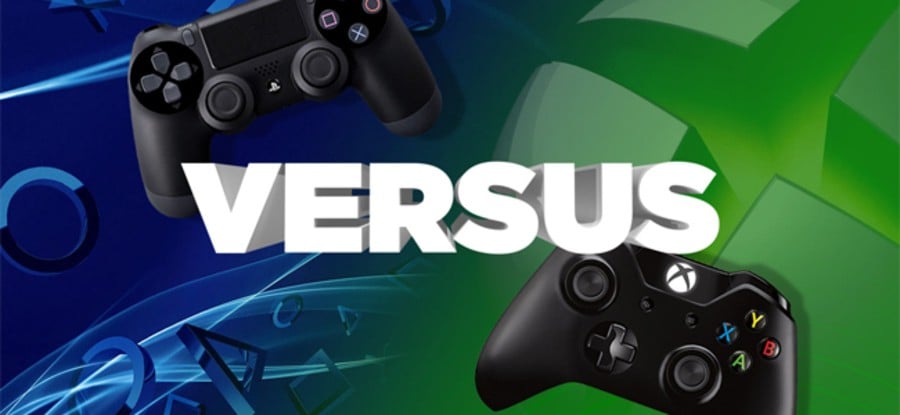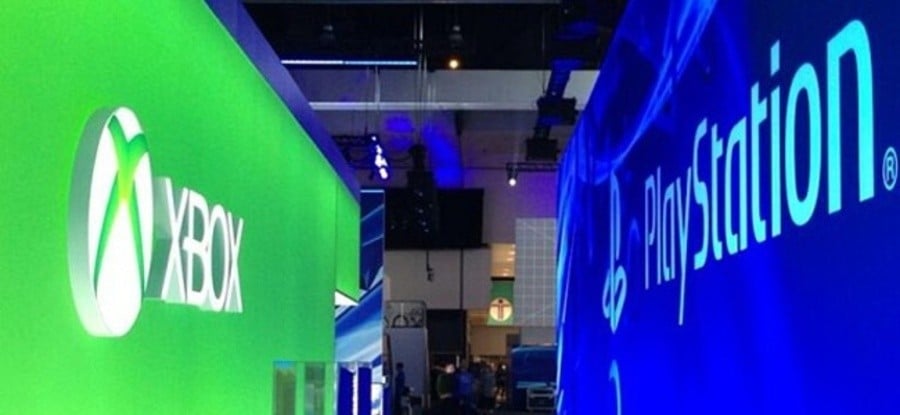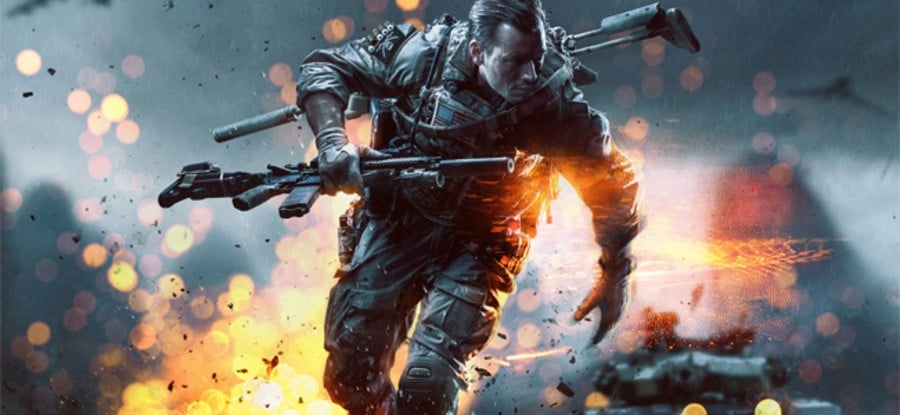
If there’s one thing that we’ve learned from the abundance of animated Ron Paul images being posted around the web today, it’s that it’s most definitely happening. The expiration of Battlefield 4’s next generation review embargo inevitably brought with it more drama than a daytime soap opera overnight, with epic NeoGAF threads, social network meltdowns, and even clarification posts taking centre stage. But while the response to the first round in the PlayStation 4 and Xbox One’s ever intensifying battle has been undeniably entertaining, how much does it all really matter?
The word from the trenches is that Sony’s impending system is on the front foot when it comes to raw horsepower. We’ve more or less known this since lead architect Mark Cerny proudly projected the words 8GB GDDR5 RAM during February’s big PlayStation Meeting press conference, but now we’re finally starting to see the differences. DICE’s upcoming first-person shooter runs at a higher resolution on the Japanese giant’s format, and has a much more stable framerate. And word has it that this won’t be the last third-party game to boast an advantage on the PS4.

It’s a massive turnaround from the PlayStation 3, which for large chunks of the past seven or so years has come out worse in console comparisons. An awkward architecture meant that, while first-party studios such as Naughty Dog were able to push the platform to its absolute limits, external studios had to invest significant resources into development in order to get their titles approaching anywhere near parity with their Xbox 360 counterparts. In cases such as Bayonetta, which barely ran on Sony’s system at all, this was front page news.
But despite the hundreds of Digital Foundry articles and forum posts, how much did the PS3’s supposed inferiority really affect your purchasing decisions? If you’re reading this website, we’re going to assume that you did the majority of your gaming on the Japanese giant’s black behemoth – but did you ever wish that the foliage in Mafia II looked like its Xbox 360 companion, or lament the fact that Red Dead Redemption lacked a few lines of resolution? These are big differences in screenshot comparisons, but they’re hardly the end of the world when you’re engrossed in a game.

The reality is that comparison articles – for all of their worth – tend to exaggerate the differences between systems. The reality is that we don’t play games under test lab conditions, with identical images running side-by-side in slow motion so that we can pick out the texture discrepancies and debate the number of framerate hiccups when an explosion occurs on screen. In most cases, we simply play, and hopefully enjoy, our games. Granted, there’s always the desire to be blown away, but does knowing that a title has improvements elsewhere impede that?
With next generation consoles representing a significant investment for all but the most financially flush consumers, we respect that there’s a desire to get the best bang for your buck. After all, who wouldn’t want to buy the most capable machine on the market? We also appreciate that those lucky enough to own both systems may want to purchase the strongest version of a specific multiformat title available. But if technical performance is really that important to you, then perhaps you shouldn’t be dabbling in the console world at all.

With the more open PC platform easily upgradeable, and Steam providing a quality ecosystem for gamers to play in, it seems curious to us that anyone would want to debate the differences between Battlefield 4’s resolution on the PS4 and Xbox One, when the humble computer is perfectly capable of flawless 1080p. Yes, we understand that there’s an element of technological knowhow attached to gaming on more customisable rigs, but it stands to reason that anyone affected by resolution differences would know their GPUs from their CPUs.
We’re not trying to downplay the story that’s surrounding both Sony and Microsoft’s next generation systems at the moment, and nor are we even attempting to shrug aside the emerging hardware advantages of the PS4 – we just can’t help but feel that the reaction has been a little bit exaggerated over the past twelve hours. If the Japanese giant’s impending platform turns out to be the best place to play most third-party software, then that’s fantastic – but we spent the majority of the PS3’s lifespan with “inferior” multiformat releases, and thoroughly enjoyed them all the same.
Do you use format face-offs to decide which version of multiplatform games to buy? What impact do you think that the PS4’s emerging hardware superiority will have moving forwards? Compare your opinions to ours in the comments section and poll below.
Has a console comparison ever impacted your purchasing decision? (43 votes)
- Yes, I regularly switch platforms due to visual and performance differences
- I have reconsidered my purchase in the past, but only in extreme cases
- No, I tend to buy games on my preferred platform regardless of differences
Please login to vote in this poll.





Comments 33
I doubt the X-Box One will surpass the PS4, even the Devs in a Q&A on Reddit admitted that the PS4 was the better of the two machines.
I prefer Sony and Nintendo to Microsoft for many reasons other than technical power. And while I was playing third party games on PS3 I never once lamented the fact that the graphics might have been better on Xbox360. It literally never once crossed my mind. So I clearly don't buy my system based purely on where the power is at. That being said, as a Sony fan, it is simply an added bonus that makes me very satisfied that my console will have the best graphics.
Gamers need something to do while waiting for the next generation systems to be released in November and, since the two systems are coming out at almost the exact same time (give or take a week or two), most gamers are probably just trying to convince themselves that the $400 they plunk down for the PS4 (or $500 they shell out for the XBox One) was the right decision. It's a lot of money, and we can't see the future. Making the right choice is important. After all, nobody wants to be that guy who spends his hard earned money on a system that dies a painful death with no support. Just ask me--I'll gladly show you pictures of my lonely old Sega CD and Sega 32x.
@Squiggle55 I'm in the exact same boat
It's pathetic and childish. If you genuinely care about that then you need to get back to the playground. A game is a game. Who cares who makes it or what it's on, just play it.
@jgrangervikings
"After all, nobody wants to be that guy who spends his hard earned money on a system that dies a painful death with no support."
Sadly, that sums up my console gaming experience for decades. It sucks I tell ya, it's been the same conundrum since 1990. Master System... Nothing. N64.... Nothing. GC... Nothing. Wii U... Nothing. Vita... Nothing. Why do I pick the worst supported systems? I have no idea...
Graphics really do matter to me. I had a PC when I wanted a PS1, but when I learned about overclocking etc I became a total graphics bitch. PS2 was better than the PC we had during its reign, but then I got a good card for Oblivion and it was better than 360, but I still got a PS3 just for MGS4 lol. Now my PC is still better than PS4, but I still preordered because it looked worthwhile graphically. I've always hated noticing aliasing artifacts on consoles, and I honestly think I'd be distracted by it on an XO. Anti-aliasing, in particular, is so important to me. I'd seriously cancel it if PS4 looked like the XO half of the BF4 video
I can't stand people who only care about graphics, frame rates or any of that other crap. If you're a gamer then shut up and play, no one cares which system/game you think is better, so you shouldn't either.
@XavandSo 90% of the systems you listed have/had fairly good support.
Sony and Nintendo because of the games, just for the games, i don't care too much about "potential graphics".
It matters but only if you're a multiconsole owner. As it is, the only next-gen system I think I'll have for a while is PS4 so unless that version of a game I'm looking forward to is Skyrim/Bayonetta-PS3-levels of unplayable, I'm still going to buy it. Early on things seem promising though, I don't necessarily care if the PS4 version blows away the others or not, I just don't want it to be like the early days of PS3 where third parties were unbelievably lazy with their ports. Everything is pointing towards, at worst, PS4 and X1 being on pretty much an even playing field from the get go so that's a win for PS4 owners.
Bayonetta ran fine after the patch - which is when I bought it. I never played the 360 version so I can't compare graphically, but this statement:
"In cases such as Bayonetta, which barely ran on Sony’s system at all"
is just flat out false. Maybe it looked worse, but it ran fine.
Can't argue with use of that photo though.
Format face-offs matter because people are deciding what to buy right now. Early weakness is a sign of short console lifespan. So yeah, these faceoffs are litmus tests.
Oh, it matters. It matters...
EDIT Putting a smile and wink just in case.
@Squiggle55 agree with you 100%.
All it really boils down to is a mine is better than yours argument. People like "knowing" they have the best of the best, both for monetary/value reasons and self-image reseasons. Nobody likes feeling like they've made a bad choice, and they certainly don't want other people knowing it. Bragging, elitism, it all makes you feel better about yourself and your decisions
I always pick the platform that has and will likely get the most games I'll like. If a few of those games aren't the best versions then oh well, so be it, the other games more than make up for it. If I also happen to have the platfom with the best version I'll get that one then.
The way i see it, only a fanboy would choose Xbone over PS4. Forget about specs, PS4 has better games, better graphics, better hardware, a better operating system, better pricing, better exclusives, better design, a more innovative controller, etc. Whereas the only thing Xbox one has going for it is Titan Fall and even that isn't set in stone. There really is no comparison.
@ajaychitown
That fanboy arguement can be made both ways to be fair.
It does & doesn't matter, it does matter when companies release unplayable game like Skyrim. Thats bad for both the company & the console, there is no reason a game should release in the state just because it runs better on a different platform. Also you don't need a PC for good graphics nower days, in fact going out buying a high end PC just to play games on would be a massive mistake. Seeing as console is mostly lead platform and not taking advantage of a high end PC, and PC's have a far share of shoddy ports. With the PS4 your getting for the price a very capable console, why would you want to spend more on a less capable console? thats not logical.
First, thank you Pushsquare for once again being a beacon of reason in the Maelstrom of flamewars that is the rest of teh interwebz.
Fanboy flamewars are as old as gaming itself. I can personally remember it being the same with the C64/Atari 130XE, Amiga 500/Atari ST, Nintendo/Sega with pretty much everyone of their systems over the years and so on...
I went with the 360 during current gen for many reasons and I'd lie if I'd say that knowing that the 3rd party version of various games I was playing was the more smooth version. I appreciate shiny graphics, but it's not the most important thing for me, or I would indeed go PC, I guess (I'll keep a keen eye on the development of the steam machines, though).
Next gen, I'll go with PS4, because MS disgusted me with their policies and 180s and because Sony has way more 1st party devs that'll make the games I'll be more interested in. But again, it won't hurt that I'll know that 3rd party games will look better or at least run more smoothly on the PS4.
Is it enough for me to diss X1 owners? No. It's a gaming system, not a religion. I can imagine to get an X1 in a few years, 'cause I love Halo and I'm looking forward what 343 can do on the new hardware. Also, I love Gears.
But if I was undecided on which system to get, reports of the X1 being the slower system may sway me...as it is, the PS4 is stronger and has the stronger line up for my tastes, so it's a no brainer.
At the point where I own both PS4 and X1, I'll definitely buy most of my 3rd party stuff on PS4...only exception would be X1-exclusive DLC that I'd absolutely have to play.
It's pathetic that people care so much about how technically good a game looks. We're at the point where graphics are all but guarantee to look good on the technical side, so why obsess so much over small details?
I dont understand how people can be pathetic for having an interest in the technical side of the industry. Ive studied electronics & have worked with a few indie-level studios as a level designer over the years, so yeah I do have a genuine interest in the technical side of things. It seems these days its trendy to hate on graphics and be all about gameplay. Funnily enough if you beleived that n weren't jumping on a bandwagon, you'd be playing 16-bit era consoles seen as that was when gameplay was at its most refined from gamings arcade roots.
@MadchesterManc My Master System is still by far my most played console
@rjejr : think article is refering to pre-patch bayonetta .
(haven't found pushSquare to issue false statements for sensalationisms sake)
Nop it doesn't matter IMO, all it matters is gameplay.
@Squiggle55
I completely agree with you. I always buy my games on my prefered systems, even if they look a bit worse. I never bought a system from Microsoft and always played Sony and Nintendo systems, which are always great.
@rjejr
Agree with you on all levels. I bought Bayonetta a while ago on the PS3 and loved it. As I haven't read a lot about the differences before I thought it ran fine (I was lucky enough to buy it after the patch). For me, the only thing that makes me think about buying a new system is the exclusives as I can live with a bit graphical gap between systems.
For me, it's more about games, though it doesn't hurt that PS4 is more powerful. I also like Sony's take on partnering up with newer gaming franchises instead of getting exclusive content from COD and such, it's forward-thinking.
Also, the whole DRM mess doesn't help Microsoft's case, AT ALL. Nintendo and Sony for me.
@eliotgballade - I know he was referring to the pre-patch, but I think taking into consideration how many games get patched these days - even the PS4 itself needs a day 1 patch - I think it would be fair to mention that it was unplayable Day 1, but it was playable later w/ a patch.
@rjejr : possibly , but bayonetta's day one problems unfortunately single it out for oft quoted notoriety (fairly - or otherwise)
@MadchesterManc "I dont understand how people can be pathetic for having an interest in the technical side of the industry. Ive studied electronics & have worked with a few indie-level studios as a level designer over the years, so yeah I do have a genuine interest in the technical side of things. It seems these days its trendy to hate on graphics and be all about gameplay. Funnily enough if you beleived that n weren't jumping on a bandwagon, you'd be playing 16-bit era consoles seen as that was when gameplay was at its most refined from gamings arcade roots."
This has nothing to do with bandwagons nor am I "lol graphics, it's all about the gameplay". Like you, I am very interested in the technical evolution of gameplay and looking through comparison pictures is interesting to me. As someone hoping to get into the video game industry, graphics are not something I deny the importance of.
But I'm not going to pretend that graphics are the end-all, be-all of games. I don't care about how many pimples a person has and I have no intentions of arguing for hours over which console has the slightly better-looking variation of a game. The Battlefield 4 thread had a massive arguments over slight difference in graphics. Slight differences in graphics. As if that is going to suddenly make a game better.
People have even cancelled pre-orders over how a game doesn't look the way they wanted it to, even though it has no effect on game play and the visuals are barely noticeable from a casual viewpoint. Don't know about you, but I fail to see the logic behind it.
Like I said, all games can look technically good without an excruciating amount of work. Even if we're going into graphics, aesthetic, frame rate and performance concern me more than which version of a game has slightly better texture.
Call of duty Ps4 1080 p native
Xbone 720p upscaled to 1080 p. The jaggies -_-
Nintendo and sony for me as well, nothing against xbox at all, just dont have the money for all 3 systems, and refuse to dish out all my money
It is not critical, but for me, the quality of the graphics can impact the level of immersion. Certain games, like movies and books are about transporting the player into another world. Not saying that you won't enjoy the game on any version, but fuzziness and the lack of anti aliasing especially can break that illusion.
It is relevant at the moment because so many people are about buy a new console. For many, it will be part of their decision process. Once the console is purchased (either way), who cares. Just play and enjoy the games on the system you chose.
Leave A Comment
Hold on there, you need to login to post a comment...